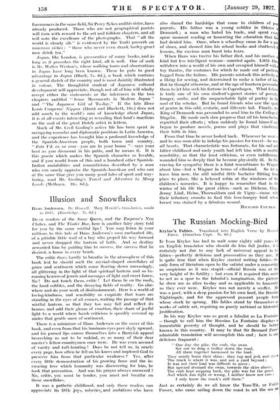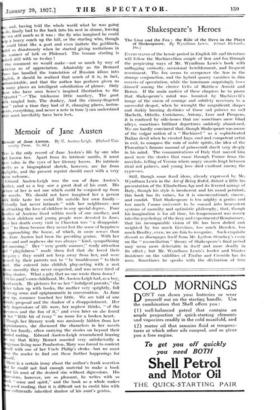The Russian Mocking-Bird
Iv Ivan Krylov has had to wait some eighty odd years for an English translator who should do him full justice, it is certainly not due to any lack of universal appeal in his fables—perfectly delicious and provocative as they are. It is quite true that when Krylov started writing fables—the only form of literature open to the satirist under a censorship as suspicious as it was stupid—official Russia was at the very height of its futility ; but even if it required this much to act as a spur to the fabulist's imagination, the pictures he drew are as alive to-day and as applicable to humanity as they ever were. Krylov was not merely a scoffer. lie was a poet, with a deep passion for his own land, the Russian Nightingale, and for the oppressed peasant people from whose stock he sprung. His fables stand by themselves as works of subtle art, requiring no purely national or historical justification.
In his way Krylov was as great a fabulist as La Fontaine —though to call him the Russian La Fontaine displays 3 lamentable poverty of thought, and he should be better known in this country. It may be that Sir Bernard Part' admirable translation will accomplish this end ; here is one
delicious fragment : " One day the pike, the crab, the swan
Set out to drag a trolley down the road,
All three together harnessed to the load.
They nearly burst their skins : they tug and jerk and Atoll The truck is where it was, and not a yard beyond : It was not their load was difficult to move : But upward strained the swan, towards the skies above, The crab kept stepping back, the pike was for the pond. And which was right or wrong, I neither know nor care : I only know the truck's still there."
Just as certainly do we all know the Tom-Tit, or Futile Fusser, who came sailing down the coast to set the sea 00
and, having told the whole world what he was going do, finally had to flee back into his nest in shame, leaving sea still much as it was : the fly who imagined he could fp a heavy coach up the hill, or the starling who, though could bleat like a goat and even imitate the goldfinch, led so disastrously when he started giving recitations in e manner of lark or Philomel. The human starling is deed still with us to-day !
One comment we would make—not so much by way of theism as of appreciation. Admirably as Sir Bernard arcs has handled the translation of Russian idiom into iglish, it should be realized that much of it is, in fact, translatable, and that the author has perforce given us many places an intelligent substitution of phrase. Only ose who have seen Serov's inspired illustration to the Quartet "—" The tricksome little monkey, The goat th tangled hair, The donkey, And the clumsy-fingered .ir" (what a time they had of it, changing places, instru- ents, everything, and never a note in tune !) can understand hat must inevitably have been lost.







































 Previous page
Previous page